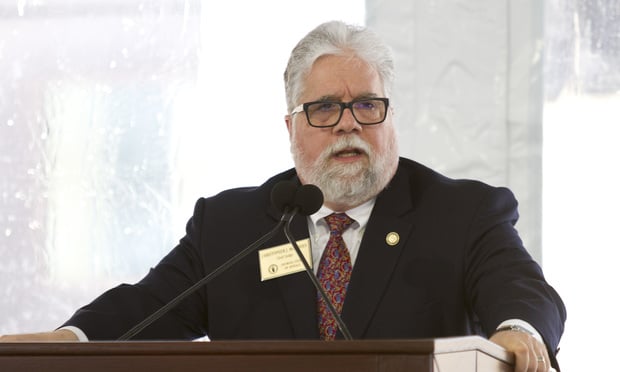Appeals Panel Scuttles $1.4M Verdict Over Open Buckhead Manhole Wreck
The Court of Appeals ruling said there was no evidence the city of Atlanta knew a manhole on Peachtree Road in Buckhead was deteriorated or that its cover was missing when a motorist ran over it.
February 24, 2020 at 03:50 PM
5 minute read
 Chief Judge Christopher McFadden (Photo: John Disney/ALM)
Chief Judge Christopher McFadden (Photo: John Disney/ALM)
The Georgia Court of Appeals threw out a $1.4 million verdict against the city of Atlanta, ruling there was no evidence offered concerning the condition of an uncovered manhole blamed for causing a motorist's injuries at the time of the accident.
While there photographs of the manhole that asserted to show it was deteriorated, the opinion said, they were taken more than a year after the accident and cannot be taken as evidence of its condition when plaintiff Pamela Dale drove into it.
According to court filings, Dale was driving along Peachtree Road in 2016 when she drove over an open manhole.
Her filing said the front wheels of Dale's car became "airborne," flying upward 4 or 5 feet and continuing on another 45 feet before stopping.
The undercarriage of Dale's Mercedes-Benz sedan was extensively damaged, and she suffered a compression fracture in her spine, a fractured hand and lacerated arm, accruing about $84,000 in medical bills.
In 2017, Dale sued the city and its Department of Watershed Management for negligence, arguing, among other things, that its failure to regularly inspect manholes unless someone reports a problem allowed the one that caused Dale's wreck to deteriorate to a point that its cover was several inches below the level of the pavement, increasing the risk that its cover would become dislodged, and that there were cracks in the surrounding pavement, indicating structural problems.
Watershed Management was dismissed early in the litigation, and the case went to trial in February 2019 on Dale's claim that the manhole's condition constituted a public nuisance.
Following a two-day trial before Fulton County Superior Court Judge Eric Dunaway, the city filed a motion for a directed verdict, arguing that Dale did not prove all the elements to support her claims.
Dunaway denied the motion, and the jury awarded $1.4 million in damages.
In a Feb. 21 opinion the Court of Appeals overturned the verdict.
Chief Judge Christopher McFadden, writing with the concurrence of Judge Carla McMillian and Senior Judge Herbert Phipps, said the directed verdict should have been granted.
As detailed in McFadden's opinion, the city's own expert testified that the manhole had last been inspected in 2009 and that there was no mention made of its position relevant to the level of the pavement.
Dale's expert asserted that the 2009 report did not refer to the manhole blamed for her accident, but there was no evidence as to how the manhole looked then or when the accident actually occurred in 2016.
"Photographs taken more than a year after the collision depicted the manhole in a deteriorated condition," wrote McFadden, and Dale's expert "opined that this condition created an increased risk that the manhole cover would become dislodged."
But, he wrote, her expert conceded that he did not know how the manhole looked the day of the accident. Dale herself could not testify about its condition "because she did not see it before hitting it. And no other witness testified that the photographs of the manhole are consistent with how the area looked at the time of the incident."
"Even if we consider the defect instead to be the open manhole itself," McFadden said, "Dale still did not demonstrate the elements of nuisance, because there is no evidence of any other instance where the manhole in this case was without its cover, much less evidence that the open manhole was a repetitive and continuous condition."
Dale pointed to the city's failure to regularly inspect manholes as "evidence of constructive knowledge" that it may have been a hazard, wrote McFadden.
"Such evidence could support liability against a private premises owner in a slip-and-fall action, even if the plaintiff in that action did not show how long the hazard had been present," he said.
"But in an action seeking to impose liability on a municipality, a plaintiff must show a higher degree of culpability; mere negligence is not enough," McFadden said.
Dale's attorney, Baskin Law Group principal Michael Baskin, said they were "naturally disappointed" in the decision, and are "considering appealing the opinion given the Court's reasoning on several key points."
"Given the city of Atlanta's practice of not inspecting manholes and waiting for citizens to be hurt before they will even consider to take any action to cure the defect is reprehensible," said Baskin. "Under Georgia law, the city's gross failure to inspect should have triggered the presumption of notice of the defective manhole."
In addition, he said, the opinion "completely ignored [Dale's] expert witness's testimony that the city knew or should have known of the defective manhole based on the uncontroverted evidence at trial."
The defense was represented at trial by deputy city counsel Torrey Smith; a city spokesperson said he would seek a response but had not provided one by Monday afternoon.
This content has been archived. It is available through our partners, LexisNexis® and Bloomberg Law.
To view this content, please continue to their sites.
Not a Lexis Subscriber?
Subscribe Now
Not a Bloomberg Law Subscriber?
Subscribe Now
NOT FOR REPRINT
© 2025 ALM Global, LLC, All Rights Reserved. Request academic re-use from www.copyright.com. All other uses, submit a request to [email protected]. For more information visit Asset & Logo Licensing.
You Might Like
View All
Georgia Republicans Push to Limit Lawsuits. But Would That Keep Insurance Rates From Rising?
5 minute read
A Plan Is Brewing to Limit Big-Dollar Suits in Georgia—and Lawyers Have Mixed Feelings
10 minute readTrending Stories
- 1Uber Files RICO Suit Against Plaintiff-Side Firms Alleging Fraudulent Injury Claims
- 2The Law Firm Disrupted: Scrutinizing the Elephant More Than the Mouse
- 3Inherent Diminished Value Damages Unavailable to 3rd-Party Claimants, Court Says
- 4Pa. Defense Firm Sued by Client Over Ex-Eagles Player's $43.5M Med Mal Win
- 5Losses Mount at Morris Manning, but Departing Ex-Chair Stays Bullish About His Old Firm's Future
Who Got The Work
J. Brugh Lower of Gibbons has entered an appearance for industrial equipment supplier Devco Corporation in a pending trademark infringement lawsuit. The suit, accusing the defendant of selling knock-off Graco products, was filed Dec. 18 in New Jersey District Court by Rivkin Radler on behalf of Graco Inc. and Graco Minnesota. The case, assigned to U.S. District Judge Zahid N. Quraishi, is 3:24-cv-11294, Graco Inc. et al v. Devco Corporation.
Who Got The Work
Rebecca Maller-Stein and Kent A. Yalowitz of Arnold & Porter Kaye Scholer have entered their appearances for Hanaco Venture Capital and its executives, Lior Prosor and David Frankel, in a pending securities lawsuit. The action, filed on Dec. 24 in New York Southern District Court by Zell, Aron & Co. on behalf of Goldeneye Advisors, accuses the defendants of negligently and fraudulently managing the plaintiff's $1 million investment. The case, assigned to U.S. District Judge Vernon S. Broderick, is 1:24-cv-09918, Goldeneye Advisors, LLC v. Hanaco Venture Capital, Ltd. et al.
Who Got The Work
Attorneys from A&O Shearman has stepped in as defense counsel for Toronto-Dominion Bank and other defendants in a pending securities class action. The suit, filed Dec. 11 in New York Southern District Court by Bleichmar Fonti & Auld, accuses the defendants of concealing the bank's 'pervasive' deficiencies in regards to its compliance with the Bank Secrecy Act and the quality of its anti-money laundering controls. The case, assigned to U.S. District Judge Arun Subramanian, is 1:24-cv-09445, Gonzalez v. The Toronto-Dominion Bank et al.
Who Got The Work
Crown Castle International, a Pennsylvania company providing shared communications infrastructure, has turned to Luke D. Wolf of Gordon Rees Scully Mansukhani to fend off a pending breach-of-contract lawsuit. The court action, filed Nov. 25 in Michigan Eastern District Court by Hooper Hathaway PC on behalf of The Town Residences LLC, accuses Crown Castle of failing to transfer approximately $30,000 in utility payments from T-Mobile in breach of a roof-top lease and assignment agreement. The case, assigned to U.S. District Judge Susan K. Declercq, is 2:24-cv-13131, The Town Residences LLC v. T-Mobile US, Inc. et al.
Who Got The Work
Wilfred P. Coronato and Daniel M. Schwartz of McCarter & English have stepped in as defense counsel to Electrolux Home Products Inc. in a pending product liability lawsuit. The court action, filed Nov. 26 in New York Eastern District Court by Poulos Lopiccolo PC and Nagel Rice LLP on behalf of David Stern, alleges that the defendant's refrigerators’ drawers and shelving repeatedly break and fall apart within months after purchase. The case, assigned to U.S. District Judge Joan M. Azrack, is 2:24-cv-08204, Stern v. Electrolux Home Products, Inc.
Featured Firms
Law Offices of Gary Martin Hays & Associates, P.C.
(470) 294-1674
Law Offices of Mark E. Salomone
(857) 444-6468
Smith & Hassler
(713) 739-1250








